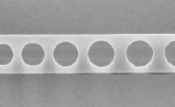The Silicon Electronic-Photonic Integrated Circuits (SiEPIC) Program is designed to train undergraduate, graduate, and postdoctoral researchers across Canada in the discipline of ICT systems that involves miniaturization of optical components onto silicon chips. Since 2007, and with NSERC CREATE funding during 2012-2018, and funded today via the SiEPICfab consortium, our workshops have trained over 500 students from 41 different universities. Click here to see upcoming training opportunities.

 May 20, 2024
May 20, 2024
 UBC, in-person
UBC, in-person
 MacLeod Building, room 3018 2356 Main Mall, Vancouver, BC V6T 1Z4
MacLeod Building, room 3018 2356 Main Mall, Vancouver, BC V6T 1Z4

 May 25, 2024
May 25, 2024
 UBC, In-person
UBC, In-person
 MacLeod Building, room 3018 2356 Main Mall, Vancouver, BC V6T 1Z4
MacLeod Building, room 3018 2356 Main Mall, Vancouver, BC V6T 1Z4
Targeting experienced silicon photonic designers (i.e., those who have previous design and test experience with passive silicon photonics), this workshop provides an opportunity for training in the design and test of active photonic integrated circuits (PICs) which will be fabricated by IME in Singapore on a multi-project wafer run. This technology enables both active and passive photonic devices to be monolithically integrated on the same chip, including modulators (ring and travelling wave); detectors (germanium); gratings for fibre coupling; deep trenches and nano-tapers for edge coupling; passive components such as optical multiplexers (diffraction or arrayed waveguide) and filters (e.g., ring resonators). This training can be a stand-alone learning opportunity or combined with your research and/or development. Target applications include optical communications and sensors.
Participants will learn about: the fabrication and process design kit (PDK); TCAD device modeling using Lumerical Solutions software suite (detectors, modulators, rings, MZI, PN & PIN junctions, thermal tuning, optical components, microwave design of electrodes); CAD layout and verification using Mentor Graphics; design for testability. Modelling and design software is provided.
Recent Training:
2023: https://www.cmc.ca/active-silicon-photonics-fabrication-workshop-2023/
2022: https://www.cmc.ca/active-silicon-photonics-fabrication-course-2022/
2021: https://www.cmc.ca/active-silicon-photonics-course-2021/
 May 15 – 19
May 15 – 19 University of Toronto
University of Toronto May 30 – Jun 10
May 30 – Jun 10 Online, UBC, Laval, & Queen’s University
Online, UBC, Laval, & Queen’s University May 17 – 21
May 17 – 21 Online, UBC & Laval University
Online, UBC & Laval University Jun 22
Jun 22 Online, UBC & Laval University
Online, UBC & Laval University May 24 – 30
May 24 – 30 Online, UBC & Laval University
Online, UBC & Laval University October 28 – November 1
October 28 – November 1 Laval University
Laval University January 22-26
January 22-26 McMaster University
McMaster University August 8 – 12
August 8 – 12 McMaster University
McMaster University August 18 – 24
August 18 – 24 UBC
UBC October 24 – 28
October 24 – 28 UBC
UBC July 8 – 16
July 8 – 16 McGill University
McGill University November 2 – 5
November 2 – 5 UBC
UBCThis short course teaches participants (industry professionals, academics) how to design passive silicon photonic devices using analytic and advanced numerical techniques. Participant designs will be fabricated by a state-of-the-art rapid-prototyping 100 keV electron-beam lithography facility (University of Washington – Washington Nanofabrication Facility, USA). All designs will be tested using an automated optical probe station (University of British Columbia, Canada) and the data provided to the participants. Participants will then analyze their experimental data.
This short course is a highly compressed version of the SiEPIC CMC Passive Silicon Photonics Fabrication workshop – 3 hours versus 6 days of instruction; a one-month versus a one-year design-fabricate-test cycle; and a total minimum time commitment of only 5 hours
 August 25
August 25 IEEE Group IV Photonics Conference
IEEE Group IV Photonics Conference October 4
October 4 IEEE Photonics Conference
IEEE Photonics Conference October 12
October 12 University of Washington
University of WashingtonThis course provides training in the design, fabrication, and test of photonic integrated circuits (PICs) targeting the imec-ePIXfab SiPhotonics passives technology. The course begins with a six-day hands-on workshop & seminar where participants: learn how to model and design silicon photonic components and circuits; learn to use the design tools (included as part of the workshop); understand the fabrication technology and design rules; and will conceive their design project. During the next several months, participants will complete a design and mask layout, with the support from and a design review with the instructors and their peers. The designs will be fabricated by imec, and participants will receive their own chips for testing.
Although a library of components is provided for those interested in designing circuits, participants can design their own advanced components such as waveguides, fibre grating couplers, directional couplers, ring resonators, Bragg gratings, optical filters, and so on. Numerous participants have published research papers based on their designs fabricated via this workshop. This workshop is suitable for first-time silicon photonic designers with a background in optics.
Recent workshops:
2023: https://www.cmc.ca/passive-silicon-photonics-fabrication-workshop-2023/
2022: https://www.cmc.ca/passive-silicon-photonics-fabrication-workshop-2022/
 Nov 8 – 22
Nov 8 – 22 Online
Online Oct 24 – Nov 4
Oct 24 – Nov 4 Online
Online May 10-17
May 10-17 UBC
UBC August 6-18
August 6-18 UBC
UBC May 1-12
May 1-12 University of Ottawa
University of Ottawa May 27 – June 2
May 27 – June 2 Laval University
Laval University May 13 – 19
May 13 – 19 UBC
UBC May 21 – 27
May 21 – 27 Laval University
Laval University May 27 – June 2
May 27 – June 2 University of Ottawa
University of Ottawa June 25 – July 6
June 25 – July 6 McGill University
McGill UniversityPackaging is viewed by industry as the single biggest technical hurdle to overcome to enable the successful commercialization of silicon photonic integrated circuits. This hands-on training provides the knowledge, tools, and opportunity to develop a packaging solution for your silicon photonic design. As part of the registration fee, participants who already have a chip(s) will be given the opportunity to get their chip packaged via one of the available packaging options, or design their own package.
The topics covered at the workshop include: the design of co-packaging for electronics and photonics; electronic-photonic circuit co-design; optical interfaces using edge and grating couplers to fibre arrays; design for test; design for packaging; ceramic carrier and printed circuit board design for DC and RF interfaces; microwave modelling; thermal management; integration of silicon photonic chip in package; wire-bonding, flip-chip bonding, and aerosol printing of interconnects. Modelling and design tools are provided
 May 2 – 6
May 2 – 6 McGill University
McGill University July 8 – 11
July 8 – 11 McGill University
McGill UniversityThis workshop provides an opportunity for training in the design, fabrication and test of CMOS integrated circuits targeting the IBM 0.13 µm CMOS technology. Target applications include IC design for optical communications and optical sensors, including designs specifically for the participants’ own photonic chips. Participants will design CMOS circuits, which will be fabricated and packaged, and delivered.
The first day of the workshop is for first-time CMOS designers, e.g. photonics designers. Topics include a brief overview of transistors, amplifiers and bias circuits; tutorials on CMOS analog circuit design using EDA tools; schematic, simulation, layout, DRC, LVS, parasitic extraction; and a brief overview of common circuit blocks such as op-amps.
The rest of the week is focused on CMOS designs specific for silicon photonics. We begin with compact models for optical devices such as phase shifter (pin, thermal), ring and travelling wave modulators, and detectors, for which circuits are to be designed. Tutorials cover optical link budget analysis; receiver design (limiting receiver, linear receiver, trans-impedance amplifiers (TIA), limiting amplifiers (LA), input offset cancellation, AGC techniques); transmitter design (modulator drivers, termination, bias control, laser drivers); tuning circuits; packaging considerations (wire- and bump-bond and package parasitics). Advanced research topics in CMOS electronics and photonic-electronic systems will be presented.
 August 31 – September 4
August 31 – September 4 Concordia University
Concordia University November 7 – 11
November 7 – 11 UBC
UBC August 26 – 30
August 26 – 30 UBC
UBCThis short course teaches students and industry professionals how to design integrated optical devices and circuits, using a hands-on approach with commercial tools. We will fabricate your designs using a state-of-the-art ($5M) silicon photonic rapid-prototyping 100 keV electron-beam lithography facility. We will measure your designs using an automated optical probe station and provide you the data. You will then analyze your experimental data.
For first-time designers, the focus project is a Mach-Zehndersilicon photonic thermo-optic switch. However, participants can design many other devices, e.g., directional couplers, ring resonators, disk resonators, Bragg gratings, photonic crystal, multi-mode interference (MMI) couplers, arrayed waveguide gratings (AWG), polarization diversity components, mode-division multiplexing (MDM), sub-wavelength grating (SWG) waveguides, slot waveguides, contra-directional couplers, etc. Example publications will be provided.
This course trains students in the design, fabrication, and test of photonic integrated circuits (PICs) targeting the AMF Si Photonics technology, available through CMC Microsystems. It can be a stand-alone learning opportunity or combined with your research and/or development. Target applications include optical communications and sensors.
Recent training:
2021: https://www.cmc.ca/passive-photonics-fabrication-course-2021/
2020: https://www.cmc.ca/passive-photonics-fabrication-course-nov2020/
 Nov 1 – 12
Nov 1 – 12 Online
Online Nov 16 – 27
Nov 16 – 27 Online
OnlineThis workshop teaches participants how to design, simulate, fabricate, and test their own quantum silicon photonic circuits.
Students gain an understanding of the fundamentals of quantum optics and how photonics can be used for quantum computing, and about the types of problems that can be solved on photonic-based processors, particularly with Xanadu’s cloud-accessed quantum processor.
Recent Workshops:
2023: https://www.cmc.ca/nserc-create-bc-cmc-quantum-photonics-workshop/
 Feb 20 – 24
Feb 20 – 24 UBC
UBCSign up for the latest news and opportunities in silicon photonics training